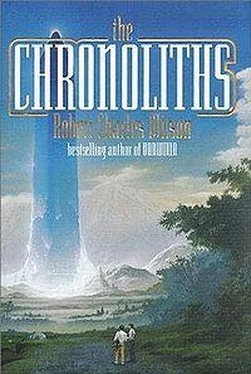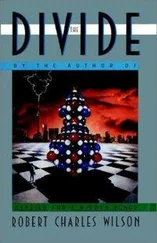“We just want the lady,” Adam Mills called from a short distance down the road.
His voice was harsh and high-pitched. It was in some ways almost a parody of Ashlee’s voice. Bereft, that is, of all warmth and subtlety.
(“We have some strange history behind us,” Ash had once said. “Your crazy mother. My crazy son.”)
“What lady would that be?” Hitch called back.
“Sulamith Chopra.”
“I’m the only one here.”
“I believe I recognize that voice. Mr. Paley, isn’t it? Yes, I’ve heard that voice. Last time, I think you were screaming.”
Hitch declined to answer, but I saw him clench the fingers — what remained of them — of his left hand.
“Just send her out and we’ll be away from here. Can you hear me, Ms. Chopra? We don’t mean to harm you.”
“Shoot him,” Ray whispered, “just shoot the fucker.”
“Ray, if I shoot him, they’ll just put a rocket in this window. Of course, they might do that anyhow.”
“It’s all right,” Sue said suddenly and calmly. “None of this is necessary. I’ll go.”
Which surprised Hitch and Ray, if not me. Some sense of her intention had begun to dawn.
Hitch said, “Now that’s just fucking ridiculous. You have no idea — these people are mercenaries . Worse, they have a pipeline straight to Asia. They’d be happy to sell you into the hands of some would-be Kuin. You’re merchandise, as far as they’re concerned.”
“I know that, Hitch.”
“High-priced merchandise, and for a good reason. You really want to hand over everything you know to some Chinese warlord? I’d shoot you myself if I thought you’d do that.”
Sue was as placid now, at least superficially, as a martyr in a medieval painting. “But that’s exactly what I have to do.”
Hitch looked away. His head was silhouetted in the window. Had it occurred to him to do so, Adam Mills could have taken him out with a well-placed head shot.
Ray, horrified, said, “Sue, no ,” and the tableau was sustained for a fragile moment: Hitch gap-jawed, Ray on the brink of panic. Sue gave me a very quick and meaningful look.
Our secret, Scotty. Keep our secret .
Hitch said, “You mean that.”
“Yes, I do.”
He turned his weapon away from the window.
The building in which we were trapped had probably been erected during one or another of the state’s cyclical oil booms, perhaps to keep prospecting gear out of the rain — not that it seemed to rain much here. The concrete floor was adrift with everything that had blown through the open door frame in fifty or seventy-five years: dust, sand, vegetable matter, the desiccated remains of snakes and birds.
Hitch stood at the west wall where the cinderblocks were water-stained and eroded. Sue and Ray were together in the northwest corner, and I stood across from Hitch at the eastern wall.
The light was dim, despite the brightness of the day, and the air a little cooler than the dry air of the prairie, though that would change as sun began to bake the tin roof. Cross drafts stirred up dust and the scent of ancient decay.
I remember all this vividly. And the sagging wooden roof beams, and the angled sunlight through the empty window, and the dry sagebrush clustered just beyond the doorway, and the glint of sweat on Hitch Paley’s forehead as he aimed his pistol — but only tentatively — at Sue.
Sue was pale. A vein pulsed in her throat, but she remained quiet.
“Point that fucking gun away,” Ray said.
Ray, in his tangled beard and sweat-stained T-shirt, looked like a middle-aged academic gone feral. His eyes were just that wild. But there was something admirable in this strained declaration of defiance, a fierce if fragile courage.
“I’m serious,” Hitch said. “She does not go out that door.”
“I have to go,” Sue said. “I’m sorry, Ray, but—”
She had taken a single step when Ray slammed her back into the corner, restraining her with his body. “Nobody’s going anywhere !”
“You going to sit on her till doomsday?” Hitch asked.
“Put your gun down!”
“I can’t do that. Ray, you know I can’t do that.”
And now Ray lifted his own weapon. “Stop threatening her or I’ll—”
But this was beyond the bounds of Hitch Paley’s patience.
Let me say, in defense of Hitch, that he knew Adam Mills. He knew what was waiting for us out there in the relentless sunlight. He was not about to surrender Sue and I think he would have died rather than surrender himself.
He shot Ray in the right shoulder — at this proximity, a killing wound.
I believe I heard the bullet pass through Ray and strike the stone wall behind him, a sound like a hammerblow on granite. Or it might have been the echo of the gunshot itself, deafening in this enclosed space. Dust rose up around us. I was frozen in my own incredulity.
There was a cough of answering shots from outside and a bullet chinked the cinderblocks near the western window. Sue, suddenly pinned behind the weight of Ray’s body, gasped and pushed him aside. She whispered, “Oh, Ray! I’m sorry! I’m so sorry!”
Tears stood in her eyes. There was blood on her tattered yellow blouse and blood on the wall behind her.
Ray wasn’t breathing. The wound or the shock had stopped his heart. A blood-bubble formed on his lips and sat there, inert.
He had loved Sue hopelessly and selflessly for many years. But once she had stepped across his motionless legs Sue didn’t look back.
She walked toward the door — staggered, but didn’t fall.
The air stank of blood and cordite. Outside, Adam Mills was shouting something, but I couldn’t make out the words over the ringing in my ears.
The Kuin of Wyoming watched all this from the western horizon. I could see the monument framed in the window behind Hitch, blue on blue, drowsy in the rising heat.
“Stop,” Hitch said bluntly.
Sue shuddered at the sound of his voice but took another step.
“I won’t warn you again. You know I won’t.”
And I heard myself say, “No, Hitch, let her go.”
Our secret , Sue had said.
And: It isn’t a secret if you tell someone .
So why had she shared it with me?
At that moment, I thought I knew.
The understanding was bitter and awful.
Sue took yet another step toward the door.
In the sunlight beyond her a swallow rose out of the dry grass, suspended in the air like a piano note.
“Keep out of it,” Hitch told me.
But I was more familiar with handguns now than I had been at Portillo.
When Hitch saw my pistol aimed at him, he said, “This is fucking insane.”
“She needs to do this.”
Hitch kept his own gun trained on Sue. Sue nodded and approached the door as if each step drew down a failing reserve of strength and courage. “Thank you, Scotty,” she whispered.
“I will shoot you,” Hitch said, “if you do not stop where you are.”
“No,” I said, “you won’t.”
He growled — it was precisely that sound, like a cornered animal. “Scotty, you cowardly fuck, I’ll shoot you, too, if I have to. Put your weapon down and you, Sue, I said stop right there .”
Sue hunched her shoulders as if against the impact of a bullet, but she was already in the frame of the door. She took another step.
For a moment Hitch’s weapon wavered — toward me, toward Sue. Then, suddenly resolute, he took aim at her back, the arch of her spine, her big bowed head.
He began — and I know how absurd it seems, to claim to have witnessed this, but in the overweening stillness of the moment, in the shadow of this bright benevolent afternoon and all of us balanced on the fulcrum of time, I swear I saw his meaty, dark finger begin to close on the trigger of the gun.
Читать дальше












